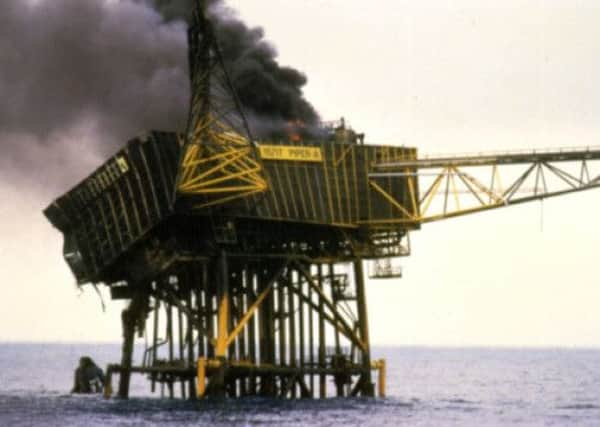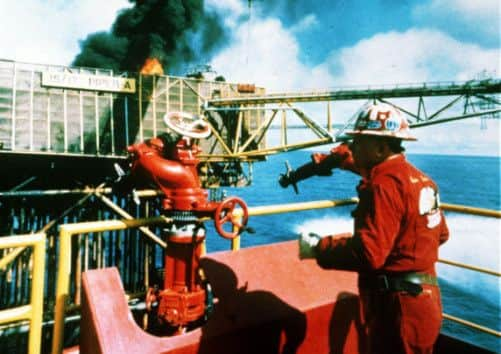Piper Alpha: Remembering the disaster 25 years on


The full enormity – and the horror – of the Piper Alpha disaster was finally driven home to me in the early hours of 7 July, 1988.
It was the moment that Jim McDonald, the veteran rigger who had been one of the few survivors to have escaped physically unscathed from the catastrophe, decided he needed a cigarette.
Advertisement
Hide AdAdvertisement
Hide AdHe and a handful of other survivors had been closeted in a hotel near Aberdeen airport to be debriefed by police officers after being flown ashore from the inferno that had claimed the lives of 167 of their workmates. And I was the only journalist who knew they were inside.


Mr McDonald, his face blackened by the dense smoke and intense flames that had almost claimed his life, and still wearing his rig overalls, told me bluntly: “It was as simple as this – you either stayed where you were and burned to death or you tried to get out.”
The veteran oilman from Stirling, then 50 years old, graphically described how huge parts of the massive metal platform – once the biggest production facility in the North Sea – had “melted like candle grease” as he desperately made his escape from the stricken installation.
He had been one of the last men to flee. And he had escaped with his life because he threw away the rulebook while those who waited for advice or orders from their superiors had perished in the panic on board Piper. He had been trapped in the accommodation block on board the Occidental-owned platform when the first blast rocked the rig.
Mr McDonald explained: “For about three-quarters of an hour we were all sitting inside.
Nobody seemed to know what to do. I decided to get myself out. I wasn’t going to sit down and get burned to death. I knew I was making for the fire, but it was useless making for the helideck. I just forced my way through the flames.”
Until he spoke – hours after Piper Alpha had been hit by the first of a series of explosions that destroyed the massive installation – I had no real comprehension of what had happened on the night of 6 July, 110 miles north-east of Aberdeen.
Nothing could prepare you for Piper Alpha.
I had already covered more than my fair share of “disasters” across Scotland: standing in the deep snow at Braemar’s Highland Games arena as the frozen bodies of the pupils from Edinburgh’s Ainslie Park School were brought down from the Cairngorm plateau; I had been on the breakwater at Fraserburgh harbour on the day all but one of the local lifeboat crew were drowned; and I was the first journalist to interview the sole oil worker to survive the Chinook crash on Shetland, in which 45 men lost their lives.
Advertisement
Hide AdAdvertisement
Hide AdBut Piper was in a completely different league – and to label it simply as another “disaster” ultimately became utterly meaningless.
It was a story that had started with a call-out before midnight to monitor reports of a possible fire on Occidental’s Piper Alpha platform. But it quickly became apparent that this was no routine offshore emergency. No-one could get through to any of the emergency services. The lines were jammed solid. Snatched conversations with the police, the coastguard and the oil company only led to speculation mounting and fears for the men on board increasing. No-one was giving out any numbers of those involved – how many were alive, how many injured and how many were feared dead. Those grim statistics would only become clear a day later.
Then, in the early hours of the morning, a coastguard source revealed: “This is no rescue operation. There are just bodies in the water.”
Word finally filtered through that there had been some survivors amongst the 226 oilmen on board. But no-one was saying then how many and what condition they were in.
In the darkness, the media gathered at the helicopter landing site in the grounds of the Foresterhill hospital complex in Aberdeen, as the first of the rescue helicopters arrived with the first casualties – swaddled in specialist blankets and other wrappings to protect their burn-ravaged bodies.
The hospital was sealed off. There would be no access to any survivors. As the helicopters continued to fly in with the injured, I slipped away from the press pack. Surely, I thought, there must be men who had survived the catastrophe who didn’t need hospital treatment.
I headed towards the heliport, close to the airport terminal buildings, and spotted two police officers on guard at the entrance to the main airport hotel. When they refused to let me in, I knew I was at the right place. And I reckoned it was only a matter of time before at least one survivor would need a cigarette or a breath of fresh air.
Jim McDonald was the first to leave the hotel. The second survivor to emerge was Iain Letham, the deckhand on the standby vessel Sandhaven, who was later to be awarded the George Medal – the highest civilian decoration for bravery – for his role in saving lives on that night.
Advertisement
Hide AdAdvertisement
Hide AdStill bearing the superficial burns he sustained when his hard hat and lifejacket melted during their desperate rescue mission, he told me how he and two of his crewmates had braved the flames to get to the devastated platform in a fast rescue boat to rescue six oilmen from the inferno.
“There was a big explosion – the final one,” he said. “I was just conscious of ending up in the water. All my gear melted – my hardhat and lifejacket melted.”
He had no idea what had become of the six men whose lives he and his colleagues had saved then. And, worse still, he did not know if his friends were alive or dead. I put down my pen and notebook. There was a limit to what I could ask him. Mr Letham was later to learn that both his mates, Brian Batchelor and Malcolm Storey, had been killed. They were posthumously awarded the George Medal.
Other survivors continued to emerge from the hotel as dawn broke over an Aberdeen and an oil industry that would be changed forever by the scale of the tragedy – the worst offshore catastrophe in the history of the global oil and gas industry.
Each of their eye-witness accounts was equally harrowing. And, as that longest day continued, the numbers finally became clearer. At least 160 dead. It was impossible to comprehend.
Almost every family in the north-east was connected in some way to the tragedy. I was no exception. Sandy Bremner, one of my classmates at Banff Academy, was one of the Occidental employees killed in the disaster.
Seven years after the publication of the Cullen Report, two men were blamed for the first time for the disaster, in a civil judgment issued by Lord Caplan. It followed a marathon court action to determine whether the platform’s operator, Occidental, could recover more than £100 million in compensation payments from contract companies working on Piper Alpha.
Lord Caplan ruled that Bob Vernon, who was given a posthumous award for bravery after the disaster, and his colleague Terry Sutton had been negligent in the run-up to the series of fires and explosions on board the Occidental platform.
Advertisement
Hide AdAdvertisement
Hide AdThe judge said that Mr Sutton, a fitter from Fraserburgh, had failed to tighten bolts on a flange, fitted in place of a valve that had been removed during maintenance work on a condensate pump on the platform. And Mr Vernon, a production
operator from Falkirk, had then put the pump back into operation, without checking the system, leading to a gas leak, which triggered the initial explosion.
It was a view which, to my knowledge, no-one directly affected by the disaster shared – not least Gavin Cleland, the Glasgow pensioner who devoted the last 16 years of his life fighting for justice for his son Robert and the 166 other oilmen killed in the disaster.
He campaigned relentlessly for Occidental to be prosecuted for its role in the catastrophe and for the crime of corporate manslaughter to become part of Scots law. He died in July, 2004, aged 75, his aim of having Occidental brought to book still unfulfilled.
SEE ALSO